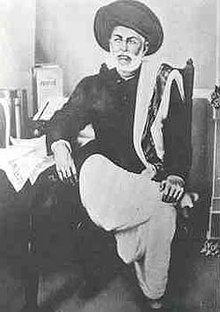Jotirao Govindrao Phule
| Jyotirao Phule | |
|---|---|
 |
|
| Born |
11 April 1827 Bhiwani,Pune, British India (present-day Maharashtra, India) |
| Died | 28 November 1890 (aged 63) Pune, British India (present-day Maharashtra, India) |
| Other names | Mahatma Phule / Jyotiba Phule/ Jotiba Phule / Jotirao Phule |
| Spouse(s) | Savitribai Phule |
| Era | 19th century |
|
Main interests
|
Ethics, religion, humanism |
|
Influences
|
|
Jyotirao Govindrao Phule (11 April 1827 – 28 November 1890) was an Indian social activist, a thinker, anti-caste social reformer and a writer from Maharashtra.
His work extended to many fields including eradication of untouchability and the caste system, women's emancipation and the reform of Hindu family life. On 24 September 1873, Phule, along with his followers, formed the Satyashodhak Samaj (Society of Seekers of Truth) to attain equal rights for people from lower castes. Phule is regarded as an important figure of the social reform movement in Maharashtra. He and his wife, Savitribai Phule, were pioneers of women's education in India. He is most known for his efforts to educate women and lower caste people. The couple were among the first native Indians to open a school for girls in India.
Jyothirao Govindrao Phule was born in 1827 into a family that belonged to the agricultural Mali caste, traditionally occupied as gardeners and considered to be of the shudra varna in the ritual ranking system of Hinduism. The original surname of the family had been Gorhe and had its origins in the village of Katgun, in present day Satara District, Maharashtra. Phule's great-grandfather worked as a chaugula, a lowly type of village servant, in that village but had to move to Khanwadi in Poona district after murdering a Brahmin with whom he had a dispute. He prospered there but his only son, Shetiba, who was of poor intelligence, subsequently squandered what had been gained. Shetiba moved himself and his family, including three boys, to Poona in search of some form of income. The boys were taken under the wing of a florist, who taught them his trade. Their proficiency in growing and arranging became well known and they adopted the name of Phule (flower-man) in place of Gorhe. Their fulfilment of commissions from the Peshwa, Baji Rao II, for flower mattresses and other goods for the rituals and ceremonies of the royal court so impressed him that he granted them 35 acres (14 ha) of land on the basis of the inam system, whereby no tax would be payable upon it. The oldest brother machinated to take sole control of the property, leaving the younger two siblings, including Jyotirao Phule's father, Govindrao, to continue farming and flower-selling.
...
Wikipedia
